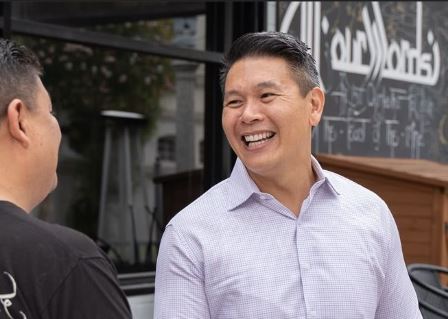How do you say “whoops” in Vietnamese? That’s what Derek Tran, a 43-year-old Democrat, might be wondering right about now. Tran is one of the many fresh faces stepping up to challenge Republican-controlled House seats—an ongoing trend that media outlets love to spotlight during election seasons. But this time, there’s an unexpected twist in his story.
Tran is aiming to unseat GOP Rep. Michelle Steel in California’s 45th Congressional District. What makes him stand out? He is touted as “the only candidate that speaks fluent Vietnamese,” a claim highlighted by the New York Post. This claim carries weight in a district where over 37% of the population identifies as Asian, and Vietnamese is the third-most spoken language at home.
On Friday, Tran received an enthusiastic write-up from the Los Angeles Times. The piece noted that California’s 45th District has the largest Vietnamese population outside of Vietnam but has yet to send a Vietnamese American representative to Washington D.C. Democrats are hopeful that Tran could change this narrative by appealing to a demographic that has historically leaned Republican since the 1980s.
The Challenge: Winning Over Voters
According to Sara Sadhwani, an assistant professor of politics at nearby Pomona College, ethnicity and shared identity can significantly influence voter behavior. While this gives Tran a fighting chance, it’s worth noting that Steel also shares Asian heritage. Her campaign questioned whether Tran could capture enough support from Vietnamese voters, citing primary data showing Steel performed better than both Tran and her competitor Kim Nguyen-Penaloza combined in areas with dense Vietnamese populations.
Despite these concerns being brushed aside in media coverage, some curious tidbits were still revealed. For instance, Tran claimed his campaign was buoyed by enthusiastic feedback from Vietnamese Americans who felt represented for the first time. He pointed out that even some conservative voters were swayed by his family’s immigrant story and military service—he spent eight years in the U.S. Army Reserve and had active duty during homeland security operations back in 2003.
However, buried at the end of what read like a promotional piece for his campaign was an eyebrow-raising admission: “Tran said Vietnamese was his first language but he has lost his childhood fluency.” He clarified that while he understands most conversations conducted in Vietnamese, he uses a translator because he fears miscommunication due to “broken” proficiency.
A Language Mishap or Deceptive Marketing?
So wait—what happened here? Let’s rewind just one day earlier when the New York Post challenged Tran’s assertion of fluency with evidence from a February interview on Saigon Entertainment Television—a California-based Vietnamese-language station. During this interview, when asked about his military service years, he stumbled through questions without grasping them fully.
For much of that segment—and subsequent appearances—Tran relied heavily on translators for communication with local Vietnamese communities. Just four days later on Little Saigon TV, he repeated this pattern: answering questions in English while relying on someone else to translate into Vietnamese afterward.
The same situation unfolded again during campaign events where it seemed clear he wasn’t engaging directly with voters without help from phonetic scripts or translators—even reading speeches off paper rather than speaking confidently in Vietnamese as he claimed.
Adding fuel to fire were comments made by representatives of the Democratic Congressional Campaign Committee (DCCC). Initially defending their candidate against accusations of misrepresenting his language skills, they proclaimed him as “the pride and joy of Little Saigon.” DCCC spokesperson Dan Gottlieb urged opponents like Steel to engage more substantively rather than resorting to cultural attacks against someone with such roots.
Yet many saw these defenses as flimsy when considering how openly tran had discussed needing translation help before making claims about fluency—suggesting perhaps intentional vagueness or misrepresentation regarding his bilingual abilities.
Media Coverage vs Reality Check
Interestingly enough, just hours after glowing reports appeared touting Tran’s candidacy came another article revealing stark contradictions between his statements and reality concerning language skills. On the same day as praise from the L.A. Times rolled out came news confirming that indeed Tran himself acknowledged speaking only “broken” Vietnamese and relying on translators for effective messaging delivery during campaigning efforts.
In other words? It seems we’ve hit upon quite an ironic scenario here; unlike typical political rhetoric expected from Democrats today (we’re looking at you), there appears genuine confusion surrounding what constitutes ‘fluency’ versus mere conversational capability among constituents eager for representation reflective not only culturally but linguistically too!
Despite attempts made throughout various articles emphasizing community appreciation toward candidates showing effort toward engagement—the true depth behind those interactions remains murky given inconsistencies presented across platforms reporting differing narratives surrounding candidacies like Mr. Trans’.
Could it be possible we are witnessing another case study illustrating just how tricky navigating political landscapes can become when identities intertwine with perceived authenticity?


Leave a Comment